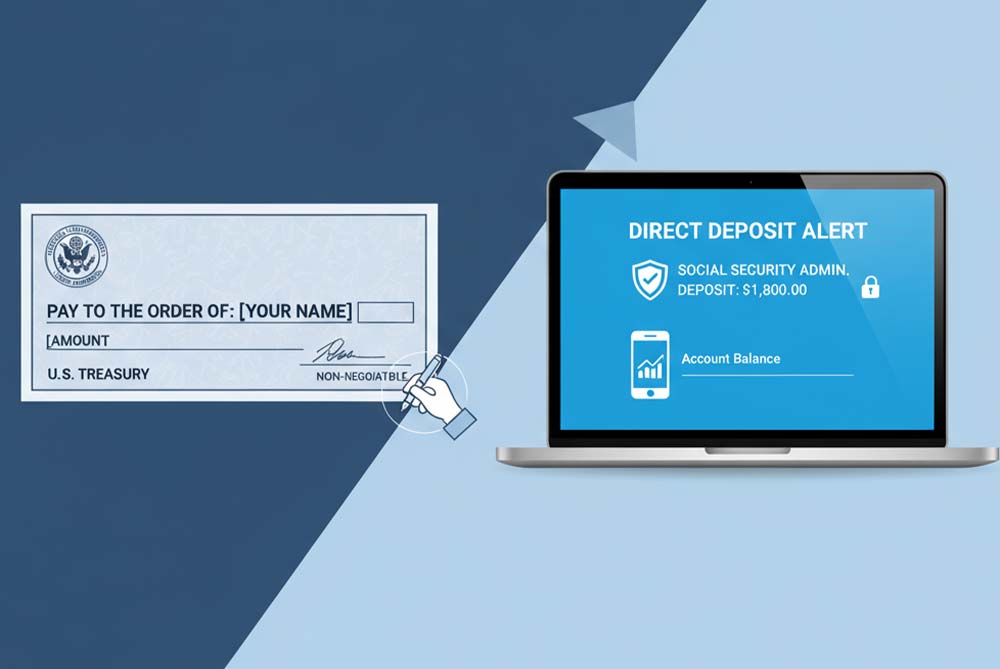
Federal Benefit Checks Transition to Electronic Payments This Month
We just reminisced the first benefit check that was mailed out in January 1940, as we celebrated Social Security’s 90th birthday this August. The program continues to serve as the foundation of economic security for 70 million Americans. It still serves as the primary, or only source of income in retirement for seniors.
As of September 30, 2025, the Social Security Administration (SSA) will no longer issue paper checks for most federal payments. This executive order (EO) will directly impact over 500,000 Social Security beneficiaries, which includes disability recipients. This EO is part of a broader government-wide initiative to modernize payments systems to and from America’s bank account and enhance service delivery.
What are the Advantages of Electronic Payments?
There are many advantages of electronic funds transfers (EFTs) including:
- Cost savings, with checks costing 50 cents each, compared with 15 cents for an electronic funds transfer
- Faster payment processing
- Quicker access to funds
- Less risk for paper check to get stolen, delayed, or lost in the mail.
- Increased Security
- Convenience
The SSA announced they are preemptively sending notices to people currently receiving paper checks, explaining the upcoming change and highlighting the benefits of switching to EFTs. All benefit checks will include an insert explaining the steps a beneficiary can take to transition to electronic payments. Technicians are ready to assist these efforts aim to ensure a smooth transition and help recipients understand their options.
Advocates fear that this change will hurt marginalized Americans lacking access to digital services and may not even know this phase-out is coming. “A lot of claimants move around and don’t always get their mail,” says Jennifer Burdick, a divisional supervising attorney in the SSI Unit at Community Legal Services in Philadelphia. “And the folks that I represent who get paper checks mostly learned from me about this transition.”
According to the AARP, about one out of every five households headed by someone over the age of 65 is unbanked or underbanked. People who are underbanked may have a bank account but still primarily rely on alternative banking services, like check cashing establishments, to handle their money.
The director of Social Security and disability policy at the Center on Budget and Policy Priorities, Kathleen Romig, notes that the people most affected by this change tend to be the most vulnerable, “often unbanked or unhoused, and lacking in the tools and skills they need to access digital services.” There are reasons these Social Security recipients haven’t made the electronic switch, which includes being wary of financial institutions, while others simply don’t have enough money to open a bank account. “This is a population that can’t afford to miss a payment, so it’s very important that the Trump administration manage the transition without interrupting their benefits,” Romig said.
Electronic Payment Options
If you are still receiving paper check payments, it’s time to convert over to an electronic method. Beneficiaries who request an exemption from the electronic payment requirement must file a waiver with the U.S. Treasury by calling 1-877-874-6347. SSA technicians are available to assist beneficiaries with this transition and to answer any questions.
There are two easy ways to receive federal benefit payments electronically:
- Direct Deposit to a checking or savings account. Old-Age, Survivors, and Disability Insurance (OASDI) beneficiaries can use or sign up for a my Social Security online account to manage direct deposit information and access benefit details. Supplemental Security Income (SSI) recipients and international beneficiaries can call 1-800-772-1213 for assistance.
- Direct Express® Card, a safe and convenient prepaid debit card option for those without a bank account. To enroll, call 1-800-333-1795or visit usdirectexpress.com.
Contact Lowery Law Group at info@lowerylegal.com or call (843) 991-0733. There is no fee for a free consultation regarding your claim. Lowery Law Group is experienced in handling cases in South Carolina as well as Georgia.


